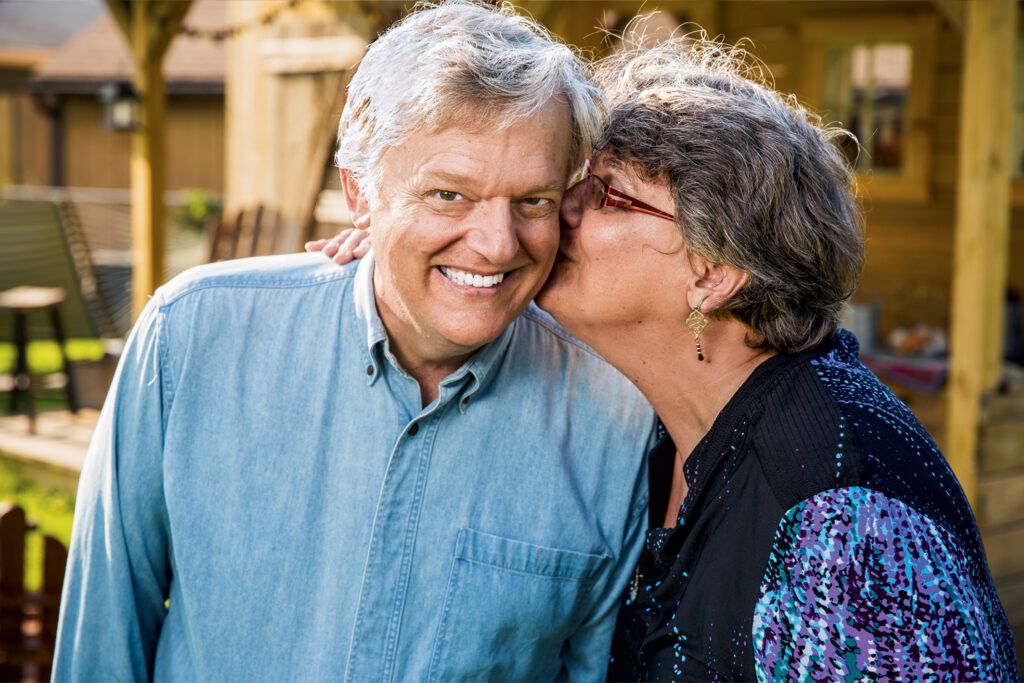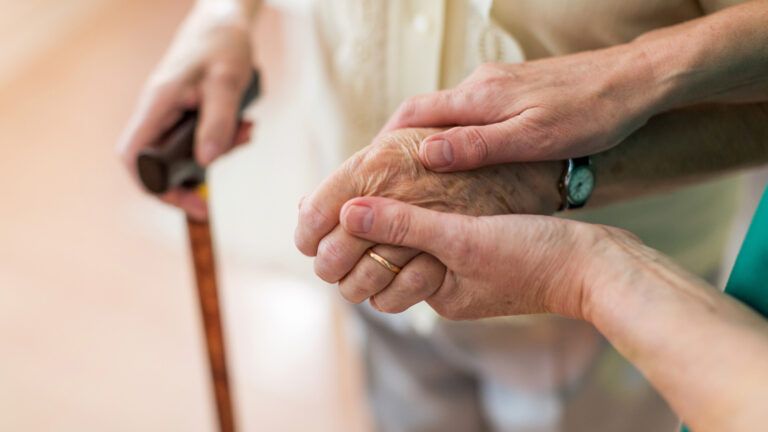Our lost year. Looking back, that’s what I consider it, that first year after my husband was diagnosed with Alzheimer’s. A gerontologist at the Cleveland Clinic broke the news to us one afternoon in January 2012. “Bob has what’s known as early-onset Alzheimer’s,” he told us.
I was stunned. Yes, Bob had been having some memory lapses and uncharacteristic moments of anger—worrisome enough that he’d undergone neurological testing at the clinic—but I thought it was because he was spreading himself too thin with work, volunteering and his Bible study at church. He’d never had major health issues. There was no history of dementia in his family. And he was only 58!
FOR MORE INSPIRING STORIES, SUBSCRIBE TO GUIDEPOSTS MAGAZINE
You’ve probably heard people say 60 is the new 50. Bob and I definitely felt that way. We were in the prime of our lives. Our two sons were grown, and this was supposed to be our time to pursue our own interests. There was still so much we wanted to accomplish.
That’s why both of us worked multiple jobs. Bob loved his career in broadcasting. He had a number-one-rated radio talk show on WTAM every Saturday morning. Once a week he hosted the Ohio Lottery drawing on live TV—everyone in Cleveland knew him for that.
I was a manager for a nonprofit organization that served refugees resettling in our area. Then there was the creative work we were proudest of—the videos and award-winning documentaries we made together.
Even though we were partners, we each focused on the aspects of the business that we did best. I handled the research and writing. Bob was the cameraman, editor and all-around tech guy.
Whoever was most passionate about a particular project would take the lead on it. I was in charge of a documentary about the stories in quilts. Bob drove the ones about baseball in Cleveland. Our offices were across the hall from each other, but we got together when we needed to.
That was also the secret to our successful marriage of 37 years: Each of us was able to maintain independence and find fulfillment within our partnership. We weren’t attached to traditional roles in our marriage.
READ MORE: TAKING CARE OF YOURSELF AS YOU CARE FOR OTHERS
Bob always encouraged me to pursue my professional goals, and he didn’t shy away from housework or taking care of the boys. He was even willing to put my career ahead of his. When I was working with a nonprofit based in Washington, D.C. (and commuting there regularly), our older son was in kindergarten only half days. Bob watched him the rest of the day so I could focus on my job.
Honestly, Bob was more of a natural caregiver than I was. He was that ideal mix of optimistic, dependable and easygoing. Nothing ever seemed to faze him. If the boys acted out, if some glitch happened on air, if I got aggravated, Bob rarely showed a hint of frustration (that’s why I got concerned that he’d started yelling lately when he misplaced something or couldn’t load a program).
I wasn’t even-keeled like that. I was prone to worrying, overthinking things and getting overwhelmed.
Which was exactly what happened after Bob received his diagnosis.
“I can’t say with certainty how quickly his memory and cognitive abilities will decline,” the Cleveland Clinic specialist continued. “Every patient is different. There are medications that may slow the disease. But there will come a point—sooner rather than later—when Bob won’t be able to work. Eventually he will likely need full-time care.”
Bob nodded, looking pensive. Did he understand the ramifications of what the doctor was saying? I couldn’t tell.
I felt sick. The work Bob loved depended on his verbal fluency and quick thinking. How incredibly cruel that those were the skills Alzheimer’s was already eroding. Even someone as easygoing as Bob would be devastated to lose the career he’d devoted himself to for decades. And if he broke down, that would break me.
The drive home was a blur. It was only mid-afternoon but I went straight to bed. I didn’t want to move. Didn’t want to think about what was going to happen to Bob, to us.
Bob sat beside me and held my hand. “What’s wrong?” he asked. There he was, putting me first, trying to take care of me, like always. That made me feel even worse. I pressed my face into my pillow. I wanted to be alone with my tears. But I couldn’t tell Bob that.
Soon after, I told my boss I needed to take an indefinite leave of absence. I felt I had to fill him in on Bob’s diagnosis, but I kept it a secret from everyone else. If Bob’s condition became public knowledge, I was pretty sure he’d be let go. Our health insurance came through his job with the lottery, and we couldn’t afford to lose it or our primary income just yet. I had to come up with a plan.
READ MORE: HOW TO AVOID CAREGIVER BURNOUT
But I couldn’t. I was paralyzed by anxiety and depression, unable to figure out what to do first. Should we try to work more while Bob was still able, to build a financial cushion? Or less, because of the added stress? What were our medical choices? What were we legally bound to tell Bob’s employers?
Bob was happy most of the time. He never missed his weekly Bible study. He was still going to work at the television studio and the radio station. I was thankful for that. But part of me was waiting for the other shoe to drop. When would he make a mistake on the air? Would he end up being publicly humiliated? I could tell he wasn’t quite on top of everything—could others?
Meanwhile, I was barely functioning. Some days I would lie in bed, replaying what the doctor had told us. Sooner rather than later. Those words echoed in my head like a death knell. The death of the future Bob and I had imagined. The death of the wonderful, creative work we did together. It was as if I were grieving an incalculable loss, one that hadn’t happened yet but I knew was inevitable.
I couldn’t talk to Bob about it. Our sons knew about his diagnosis, but I didn’t want to burden them with my issues too. I couldn’t tell our friends what was going on. I’d never felt so alone.
One evening Bob came home from drawing the lottery numbers and found me crying. His cheerful expression collapsed. “You’re sad all the time, Luanne,” he said. “How come I can’t make you feel better?”
His distress cut through the haze I’d been living in. These days Bob’s mood was heavily influenced by mine. No matter how sad I felt, I couldn’t let depression overwhelm me. I couldn’t bring him down.
READ MORE: A MOTHER CARING FOR A MOTHER
My most important job now was to be Bob’s caregiver. Not something that came easily or naturally to me. God, help me to be the kind of partner Bob has always been in our marriage, I asked. To put him first. To give him the care, comfort and love he needs.
I went into research mode. I looked up everything I could online. I called the local chapter of the Alzheimer’s Association. The woman who answered told me Bob could qualify for Social Security through a program that extends benefits to people with chronic diseases. She took down our address to send us some brochures.
“We also have a support group for people with early-onset Alzheimer’s and their spouses,” she said. “You could get a lot of good information there.”
A support group? I didn’t think I could handle sitting around talking about our problems. I’d just get more depressed. I needed to be active, to do something.
From what I’d read, activity would be good for Bob too. That became even more imperative when he lost his job at the radio station as part of a companywide downsizing in March 2012. Then the lottery decided not to renew his contract.
That was somewhat of a relief because I didn’t have to worry so much about hiding his condition. I searched for ways to fill Bob’s day productively, especially while I was at work (I had gone back part time).
I looked into an adult day-care program. The people there were in their seventies and eighties. Bob wouldn’t be into playing bingo and singing songs from our parents’ generation. The Alzheimer’s program at a local nursing home was more promising—people took turns reading aloud and doing simple math problems to maintain cognitive function. Unfortunately it was only for nursing-home residents.
I looked for volunteer work Bob could do, like walking dogs at the animal shelter. But it was too complicated for him to learn which dogs were safe to walk and how to record the walks in a log.
READ MORE: BIBLE VERSES FOR ALZHEIMER’S CAREGIVERS
We began to tell friends about Bob’s Alzheimer’s. They were really supportive, but it wasn’t as if they were free during the week to spend time with him. They had demanding jobs. They were still in the prime of their lives.
That might have been the biggest challenge—transitioning from a very busy, work-focused lifestyle to a much slower one with little stimulation. I couldn’t come up with enough activities to keep Bob occupied. Sometimes I felt trapped at home, and then I felt guilty, as if I was failing as a caregiver. His Bible study was the one respite I got each week.
Going through the materials the woman at the Alzheimer’s Association had sent I came across a note about the support group she’d mentioned. Bob was a people person. He might enjoy the social interaction. At least it was something new we could try.
The group met at a senior center. “I’m so glad you’re here,” Sally, the coordinator, said. “Let me introduce you to everyone.”
Bob was way ahead of her. He went up to a man sitting at a table and stuck out his hand. “I’m Bob Becker,” he said. “Nice to meet you.”
The man’s eyes widened. “I know that voice,” he said. “You’re really him! Bob Becker. I can’t believe it. I’ve been listening to you for years.”
Bob sat down next to him. His whole persona seemed to brighten. We hadn’t been here two minutes and already he’d connected with someone.
There were about 15 of us. Sally asked those with Alzheimer’s, almost all men, to sit in a circle with their spouses behind them. She made eye contact with each of the men and asked, “Tell me something funny you’ve heard.”
“My doctor said, ‘If you’re going to write that novel, now’s the time,’” one man said, chuckling.
“You have to laugh,” another man said. “There’s just so much great material.”
Bob leaned forward, listening, engaged in the conversation.
I looked on in wonder. These men weren’t being ignored, talked down to or pitied. The focus was on them, and they were responding. They felt accepted. Valued.
We moved on to how we could better communicate with our spouses. Tips like speaking in a calm, soothing voice. Going slowly, using simple sentences, not paragraphs. Asking what they wanted to do instead of deciding for them. It was so freeing to let down my guard and discuss my struggles openly.
The other couples talked about activities they did together, trips they were taking. Of course there was frustration. Heartache, even. But their lives weren’t over. Far from it.
Hope surged through me for the first time since Bob’s diagnosis. We weren’t alone in this. I could learn from the others in our group and be the caregiver my husband needed. We could live again.
And we have. Just a few days after that meeting, Bob and I went to the zoo. We hadn’t been there since our boys were little. We took our time, strolling hand in hand, like teenagers on a date. Bob took it all in, laughing at the monkeys’ antics, counting the penguins, reading aloud the fun facts that were posted.
At each fork in the path, I asked him what he wanted to see next. It was a wonderful day. I didn’t feel like a caregiver. I felt like a wife.
We’ve gone so many places since then, sometimes with friends from our support group, sometimes just the two of us. The art museum. The Rock and Roll Hall of Fame. Bowling. Bob and I even took our dream trip to Alaska.
We’re more active now than before the diagnosis. We volunteer together, delivering meals to the elderly. Once a week, we visit that nursing home with the innovative Alzheimer’s program, where I work with two residents and pick up techniques I use with Bob at home.
I no longer feel trapped, even as Alzheimer’s takes its inexorable toll. Bob rarely speaks now. He’s more easily agitated. We rely on our faith even more to bring us peace. Before breakfast, we read from God Still Remembers Me, a book of devotions written by Paul Hornback after he was diagnosed with early-onset Alzheimer’s.
We listen to music: the Beatles, the Who, Peter Gabriel. Sometimes we hold each other and sway to the beat. These little moments are when I feel closest to Bob, as close to him as I have ever felt.
“You two seem more like a married couple now than before,” a friend said recently.
I know what she means. Bob and I have lost so much to Alzheimer’s. It truly is a devastating disease. Yet it has also been an unexpected blessing. Instead of each of us running off on our individual pursuits, we have had this time together to discover a new way to love. And to live.
Learn how to capture and preserve memories for your loved one.
Did you enjoy this story? Subscribe to Guideposts magazine.






